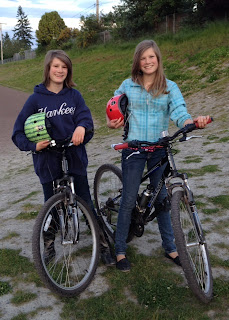For Immediate Release
Seattle, WA – Jan. 23,
2012 – Washington ranks tenth as a safe place
to bike and fourteenth for pedestrian safety ranking behind North Dakota, South
Dakota, and Nebraska, according to a new report, Bicycling and Walking in the United States:
2012 Benchmarking Report, released today by the Alliance for Biking &
Walking.“
This report
comes at a critical moment as Governor Gregoire has just proposed a
state transportation package of $3.6 billion that dedicates 72 percent to
roads, only 4 percent to transit, and lacks funding for the popular Safe Routes
to Schools Program or locally-requested state bicycle and pedestrian safety
projects.
The Benchmarking Report highlights that while 4.5% of work trips in Washington state are by bicycle or foot,
bicyclists and pedestrians account for 13.6% of traffic fatalities in Washington
state. Much of the Washington state and Seattle data for the report was
provided by the Bicycle Alliance of Washington, a state partner to the national
coalition of over 200 organizations.
Lack of investment in
bicycling and walking could be to blame as state and federal monies fall short
of the choices that Washington residents make in how they get around. For biking and walking,
the state currently allocates 2.7% of what it receives in federal monies and
the state itself assigns less than 0.5% of its transportation budget to the
Bicycle and Pedestrian Safety and Safe Routes to School Programs.
“The 2012
Benchmarking report points to the growing need for improved safety and mobility
for the many residents who walk and bike. We are optimistic that the proposed
transportation package can be improved to include investments in Safe Routes to
Schools and other popular safety programs that residents across the state want,”
says Blake Trask, Bicycle Alliance state policy director.
Since the Safe Routes to School
Program’s inception in 2005, the Bicycle Alliance has worked with several partners, as well as the
Washington State Department of Transportation and Office of the Superintendant
of Public Instruction to increase the number of
children safely walking and biking to 168 schools across the state. Program
delivery at these schools has, and continues to improve walking and biking
conditions for approximately 67,000 children. This represents almost $29
million being awarded to 90 projects from over $137 million in requests. Currently four out of every five requests
for schools are not funded.
As a part of its advocacy for
safer streets for everyone, the Bicycle Alliance is promoting state legislation
to remove red tape and provide cities and towns the freedom to set speed limits
to 20 miles per hour on non-arterial streets without a costly engineering and
traffic study. This legislation, SHB
1217 – the Neighborhood Safe Speeds Bill, does not mandate any change, it
simply provides cities and towns the local control to do so.
The report compiles persuasive
evidence that bicycle and pedestrian projects create more jobs than highway
projects, and provide at least three dollars of benefit for every dollar
invested. The report
also highlights the health benefits of active transportation, showing that states
with the highest rates of bicycling and walking are also among those with the
lowest rates of obesity, diabetes, and high blood pressure. “The data points to
one conclusion—investing in biking and walking projects create
jobs, leads to more people biking and walking, and improves safety and public
health,” says Jeffrey Miller, Alliance President/CEO.
Despite the ongoing need, the Benchmarking Report
also calls out the progress that Washington state has made in growing bicycling
and walking. “Washingtonians have responded to the improvements in safety and
infrastructure that state and local government have made over the past 20 years
by biking and walking more,” Trask notes. In 1990, 13,170 Washingtonians
identified themselves as bike commuters.
That number grew to 28,395 in 2009—a 116% increase. The number of people who walk to work in our
state grew by 14% during that same time period.
In the same period nationally, biking experienced a 64% increase while
walking declined by 12%.
The Benchmarking Report includes data on the 51
largest US cities, which included Seattle. Highlights from the report include
- Seattle ranked fourth among the large cities
nationwide with a commuter mode split of 11.5% who bike and walk to work.
Boston was tops with a combined 15.4% biking and walking mode share.
- Despite its high ranking for walking and
biking mode share, Seattle ranked sixth as a safe place to walk and twelfth
among 51 large cities as a safe place to bike. According to the report, safer
cities to bike include San Francisco, Portland, Minneapolis, Sacramento, and
Milwaukee.
“Bicycling and Walking in the U.S.: 2012 Benchmarking Report” was
funded by the Centers for Disease Control and Prevention and made possible
through additional support from AARP and Planet Bike. For more information and
to download the report visit www.PeoplePoweredMovement.org/benchmarking.
Contact:
Blake Trask
Statewide
Policy Director
Bicycle
Alliance of Washington
206.310.4762
Jeffrey Miller
President/CEO
Alliance for Biking & Walking
202.445.4415









